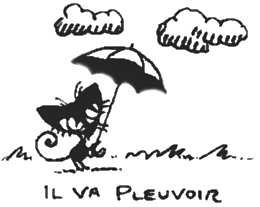3 – Les vacances
Grammaire: 3.6 – Le futur proche
The near future
Usage:
There are two future tenses in French. The first one we will learn is the called the near future, or le futur proche.
The futur proche is usually translated into English as going + infinitive (e.g., going to eat, going to drink, going to talk).
The futur proche is characteristic of spoken French but may be used in informal writing. The futur proche is used to refer to most future events in informal conversation.
Formation:
It is formed with the the verb aller (to go) conjugated in the present tense + an infinitive.
| nager ‘to swim’ | |
| je vais nager, I am going to swim | nous allons nager, we are going to swim |
| tu vas nager, you are going to swim | vous allez nager, you are going to swim |
| il, elle / on va nager, he, she (it) / one is going to swim | ils / elles vont nager, they are going to swim |
Negation:
To negate the futur proche, place ne … pas around the conjugated form of aller: Je ne vais pas nager. (I am not going to swim).
| Corey: Je vais aller à Barton Springs. J’adore l’eau. Je vais nager. Tu viens avec moi, Bette? | Corey: I am going to go to Barton Springs. I love water. I am going to swim. Are you coming with me, Bette? | |
| Bette: Tu es fou! Il fait trop froid! Je ne vais pas nager! | Bette: Are you crazy? It is too cold! I am not going to swim! |


